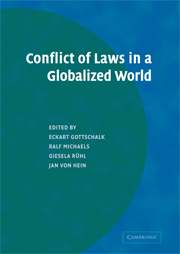Book contents
- Frontmatter
- Contents
- Preface
- Bibliographical Note
- Contributors
- SECTION I REMEMBERING ARTHUR TAYLOR VON MEHREN
- SECTION II TRANSATLANTIC LITIGATION AND JUDICIAL COOPERATION IN CIVIL AND COMMERCIAL MATTERS
- SECTION III CHOICE OF LAW IN TRANSATLANTIC RELATIONSHIPS
- 9 Party Autonomy in the Private International Law of Contracts: Transatlantic Convergence and Economic Efficiency
- 10 The Law Applicable to Intellectual Property Rights: Is the Lex Loci Protectionis a Pertinent Choice-of-Law Approach?
- 11 The Extraterritorial Reach of Antitrust Law between Legal Imperialism and Harmonious Coexistence: The Empagran Judgment of the U.S. Supreme Court from a European Perspective
- 12 Mandatory Elements of the Choice-of-Law Process in International Arbitration: Some Reflections on Teubnerian and Kelsenian Legal Theory
- 13 Application of Foreign Law to Determine Punitive Damages: A Recent U.S. Court Contribution to Choice-of-Law Evolution
- Index
12 - Mandatory Elements of the Choice-of-Law Process in International Arbitration: Some Reflections on Teubnerian and Kelsenian Legal Theory
Published online by Cambridge University Press: 08 September 2009
- Frontmatter
- Contents
- Preface
- Bibliographical Note
- Contributors
- SECTION I REMEMBERING ARTHUR TAYLOR VON MEHREN
- SECTION II TRANSATLANTIC LITIGATION AND JUDICIAL COOPERATION IN CIVIL AND COMMERCIAL MATTERS
- SECTION III CHOICE OF LAW IN TRANSATLANTIC RELATIONSHIPS
- 9 Party Autonomy in the Private International Law of Contracts: Transatlantic Convergence and Economic Efficiency
- 10 The Law Applicable to Intellectual Property Rights: Is the Lex Loci Protectionis a Pertinent Choice-of-Law Approach?
- 11 The Extraterritorial Reach of Antitrust Law between Legal Imperialism and Harmonious Coexistence: The Empagran Judgment of the U.S. Supreme Court from a European Perspective
- 12 Mandatory Elements of the Choice-of-Law Process in International Arbitration: Some Reflections on Teubnerian and Kelsenian Legal Theory
- 13 Application of Foreign Law to Determine Punitive Damages: A Recent U.S. Court Contribution to Choice-of-Law Evolution
- Index
Summary
INTRODUCTION
Choice of law in international arbitration is a topic – one among many – that Arthur von Mehren excelled at. His contributions in this field admirably combine the analytical brilliance of a world-leading conflicts law scholar, the impressive expertise of an equally world-leading comparative lawyer, and insights in concept, structure, and functioning of multilevel judicial proceedings ripened over decades. In addition, Arthur von Mehren could draw on his rich practical experiences as an arbitrator, and it was of particular importance to him to pass on his profound knowledge to the next generations: not only did he copublish one of the leading educational text books on international commercial arbitration, but he also continued to teach his strongly demanded course on international commercial arbitration at the Harvard Law School, which I had the privilege of attending during my time as Story Fellow of 1998/99.
This contribution deals with one particular issue of choice of law in international arbitration: it seeks to identify the source and nature of mandatory elements in the process of law selection, that is, the elements an arbitral tribunal is bound by while determining the applicable law. Evidently, any arbitral tribunal is primarily bound by the parties' will including their choice of law – based on their choice of choice-of-law rules that, in turn, grant party autonomy. However, the parties' freedom to choose choice-of-law rules might not be unlimited.
- Type
- Chapter
- Information
- Conflict of Laws in a Globalized World , pp. 243 - 266Publisher: Cambridge University PressPrint publication year: 2007

